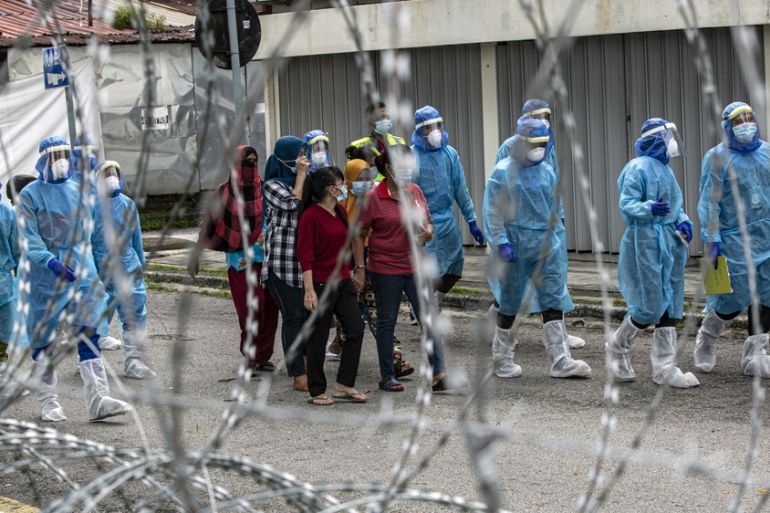Al Jazeera journalists questioned over Malaysia documentary
Team were summoned to police headquarters for probe into charges of alleged sedition and defamation.

Several Al Jazeera journalists involved in a recent documentary about Malaysia’s treatment of undocumented workers during the coronavirus pandemic were questioned at the country’s police headquarters on Friday, as the network defended its journalism and expressed “deep concern” about the investigation.
The police have said they are investigating the staff about potential sedition, defamation and violation of the country’s Communications and Multimedia Act.
Keep reading
list of 4 itemsNPR editor resigns after accusing US outlet of liberal bias
Lawmakers brawl as Georgian Parliament considers ‘foreign agent’ bill
Journalist loses foot after being badly wounded in Israeli attack in Gaza
The short film on Al Jazeera’s 101 East documentary strand called, Locked Up in Malaysia’s Lockdown, was broadcast on July 3, and investigated the plight of thousands of undocumented migrant workers arrested during raids in areas under tight lockdowns.
Malaysian officials and national television claimed the report was inaccurate, misleading and unfair.
Defence Minister Ismail Sabri Yaakob called on Al Jazeera to apologise to Malaysians, adding that allegations of racism and discrimination against undocumented migrants were untrue.
Al Jazeera Media Network has strongly rejected the Malaysian allegations.
Six #AlJazeera staff presented themselves for questioning at Bukit Aman police HQ accompanied by 7 lawyers for questioning over a documentary on treatment of migrant workers https://t.co/e04NGA4afh
— Amy Chew (@1AmyChew) July 10, 2020
In a statement released on Thursday, the Qatar-based broadcaster on Thursday said it stands by “the professionalism, quality and impartiality of its journalism”, and warned of “serious concerns about developments that have occurred in Malaysia since the broadcast of the documentary”.
The team’s lawyer Hisyam Teh Poh Teik told media on Friday that his clients were cooperating fully with the police investigation, and stressed that the journalists had requested many times to interview government officials without success. Comments made by the defence minister at two news conferences were included.
“There was no intention whatsoever on the part of Al Jazeera to create any mischief,” Teh said.
The journalists were seen leaving the police headquarters shortly after 3pm local time (07:00 GMT) after a number of hours inside. At a press conference afterwards the country’s police chief Abdul Hamid Bador said the Attorney General had not yet decided whether to proceed with charges.
While the documentary focused on the plight of foreign migrant workers, it also highlighted Malaysia’s success in containing the virus and the humanitarian efforts of Malaysian organisations to provide direct assistance to migrants in need, the network said in its statement on Thursday.
Death threats, harassment
Al Jazeera also said it has “grave concerns” about its staff in Malaysia who have faced abuse online, including death threats and disclosure of their personal details on social media.
“Al Jazeera is deeply concerned that its staff are now subject to a police investigation,” said the statement.
“Charging journalists for doing their jobs is not the action of a democracy that values free speech. Journalism is not a crime,” it added.
It said the network was “concerned for the safety of those interviewed in the documentary who have also been subjected to abusive online harassment and hate speech”.
Malaysia’s immigration department has issued a search notice for a Bangladeshi national interviewed in the documentary.
MEAA calls on Malaysia to drop its investigation into an Al Jazeera documentary and to ensure the safety of the broadcaster's journalists, some of whom are MEAA membershttps://t.co/Jn2oA3yPKD#MEAAmedia
Image: 'Locked Up in Malaysia's Lockdown' – Al Jazeera pic.twitter.com/QwawcL26kj
— MEAA (@withMEAA) July 10, 2020
Other journalists and activists have been questioned about their reporting in recent weeks.
A correspondent working for the Hong Kong-based South China Morning Post was previously questioned after she reported on the arrests of migrant workers during the coronavirus lockdown, while an activist for refugees, who has been recognised internationally for her work, was also called in about a Facebook post on the treatment of migrant workers and refugees.
“This is part of quite a sustained effort by the government to quell down on freedom of expression,” said Aira Azhari from the Institute of Democracy and Economic Affairs. “It also speaks to a broader effort to perhaps contain certain critical views within the press and civil society.”
The International Federation of Journalists (IFJ) on Friday called on Malaysia to drop the case against Al Jazeera and to allow journalists to do their jobs.
“There has been a distinct pattern under the COVID-19 crisis of media workers targeted under Malaysia’s Communications and Multimedia Act and Penal Code for simply doing their job,” the federation said in a statement. “It is urgent for Malaysia during the pandemic to prioritise the public’s right to know and for the media to be able to report freely and failrly without the threat of persecution.”
Al Jazeera urged Malaysian authorities “to respect media freedom and desist from treating its journalists as criminals”.